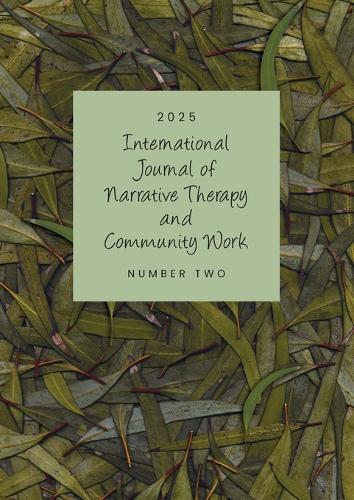Overview
International Journal of Narrative Therapy and Community Work is a peer-reviewed journal for practitioners who wish to stay in touch with the latest ideas and developments in narrative practice. It is published twice a year on the equinoxes. In this issue: Jack T. C. Chiu and Sharon S. K. Leung's human-canine project in Hong Kong considers what is absent but implicit in the social withdrawal of young people and their preference for animal connections. Sandra Coral draws on critical race theory to bring attention to the Eurocentric leanings in therapy spaces, which often leave Black neurodivergent people unsafe. Narrative therapy can help us to create ""pockets of freedom"" - spaces free from the dominant culture's interpretations and judgements - as sites of refuge and resistance, responding to the alienation imposed by colonial legacies. Stephanie Badman's work demonstrates this in the realm of genetic counselling, where the medicalised understandings often privilege professional knowledge over lived experience. Through letter writing, which elevates people's own local knowledges, narrative practice creates space for witnessing and re-witnessing preferred identities. Christine Dennstedt takes us into the liminal encounters of psychedelic-assisted therapy and draws on the narrative practice metaphor of migration of identity to loosen entrenched problem stories and allow new meanings to take shape. She also examines our ethical accountability when engaging with practices linked to Indigenous knowledges, and the need for humility, integrity and a commitment to avoiding cultural appropriation. Directing a narrative feminist lens on bulimia and abuse, Kassandra Pedersen proposes an alternative fluid language for bulimia, using the metaphor of tides. She offers a nuanced, justice-informed approach that avoids replicating neoliberal discourses on food and body management, in which the body is seen as a passive recipient of trauma. Instead, Kassandra invites us to respect the body's capacity to notice, disagree and bear witness. In a deeply moving contribution, Tanya Newman shares the voices of dying mothers who write letters for their children. These letters are not only acts of love but also portals to future re-membering, enabling both mothers and children to resist single-storied descriptions of loss. Through ""linking lives"", mothers leave behind an archive of care, preferred identities, and their unfinished yet enduring work of raising children. Tarang Kaur turns our attention to neurodivergent children, whose skills, values and acts of resistance are too often pathologised by deficit-based discourses and disregarded in the name of treatment. Through living documents, we are invited to witness children as keen collaborators and bearers of unique insider knowledge. What is dismissed as ""problematic behaviour"" can be seen as a child's creative response and skilful reclaiming of agency.
Full Product Details
Author: Dulwich Centre Foundation
Publisher: Dulwich Centre Foundation
Imprint: Dulwich Centre Foundation
Dimensions:
Width: 21.00cm
, Height: 0.60cm
, Length: 29.70cm
Weight: 0.286kg
ISBN: 9780645838558
ISBN 10: 0645838551
Pages: 110
Publication Date: 21 September 2025
Audience:
General/trade
,
General
Format: Paperback
Publisher's Status: Active
Availability: Available To Order

We have confirmation that this item is in stock with the supplier. It will be ordered in for you and dispatched immediately.



